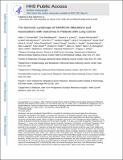Notice
This is not the latest version of this item. The latest version can be found at:https://dspace.mit.edu/handle/1721.1/134622.2
The Genomic Landscape of SMARCA4 Alterations and Associations with Outcomes in Patients with Lung Cancer
Author(s)
Schoenfeld, Adam J; Bandlamudi, Chai; Lavery, Jessica A; Montecalvo, Joseph; Namakydoust, Azadeh; Rizvi, Hira; Egger, Jacklynn; Concepcion, Carla P; Paul, Sonal; Arcila, Maria E; Daneshbod, Yahya; Chang, Jason; Sauter, Jennifer L; Beras, Amanda; Ladanyi, Marc; Jacks, Tyler; Rudin, Charles M; Taylor, Barry S; Donoghue, Mark TA; Heller, Glenn; Hellmann, Matthew D; Rekhtman, Natasha; Riely, Gregory J; ... Show more Show less
DownloadAccepted version (954.4Kb)
Open Access Policy
Open Access Policy
Creative Commons Attribution-Noncommercial-Share Alike
Terms of use
Metadata
Show full item recordAbstract
Purpose: SMARCA4 mutations are among the most common recurrent alterations in non-small cell lung cancer (NSCLC), but the relationship to other genomic abnormalities and clinical impact has not been established. Experimental Design: To characterize SMARCA4 alterations in NSCLC, we analyzed the genomic, protein expression, and clinical outcome data of patients with SMARCA4 alterations treated at Memorial Sloan Kettering. Results: In 4,813 tumors from patients with NSCLC, we identified 8% (n ¼ 407) of patients with SMARCA4-mutant lung cancer. We describe two categories of SMARCA4 mutations: class 1 mutations (truncating mutations, fusions, and homozygous deletion) and class 2 mutations (missense mutations). Protein expression loss was associated with class 1 mutation (81% vs. 0%, P < 0.001). Both classes of mutation co-occurred more frequently with KRAS, STK11, and KEAP1 mutations compared with SMARCA4 wild-type tumors (P < 0.001). In patients with metastatic NSCLC, SMARCA4 alterations were associated with shorter overall survival, with class 1 alterations associated with shortest survival times (P < 0.001). Conversely, we found that treatment with immune checkpoint inhibitors (ICI) was associated with improved outcomes in patients with SMARCA4-mutant tumors (P ¼ 0.01), with class 1 mutations having the best response to ICIs (P ¼ 0.027). Conclusions: SMARCA4 alterations can be divided into two clinically relevant genomic classes associated with differential protein expression as well as distinct prognostic and treatment implications. Both classes co-occur with KEAP1, STK11, and KRAS mutations, but individually represent independent predictors of poor prognosis. Despite association with poor outcomes, SMARCA4-mutant lung cancers may be more sensitive to immunotherapy.
Date issued
2020Journal
Clinical Cancer Research
Publisher
American Association for Cancer Research (AACR)